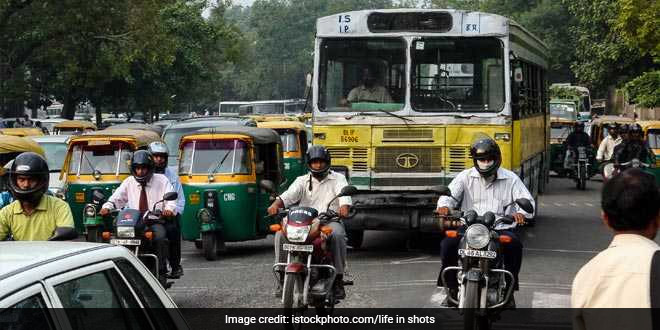New Delhi: Delhi’s air quality remained severe for a second consecutive day on Thursday, prompting the Supreme Court-appointed Environment Pollution Control Authority to order a 24-hours ban on the entry of trucks into the national capital. The entry of trucks to Delhi would be disallowed from 11 pm on Friday to 11 pm on Saturday in view of the severe pollution in the city, the EPCA instructed authorities.
In a letter to the chief secretaries of Delhi and the neighbouring states of Uttar Pradesh and Haryana, EPCA chief Bhure Lal directed them to stop the entry of truck traffic into Delhi (except essential commodities) during the period. The decision comes in view of the severe air quality of the national capital.
This would be a second time this season that a ban on the entry of trucks would be imposed. Earlier, it was done between November 1- November 12 when the deterioration of air quality was observed.
According to the Central Pollution Control Board (CPCB) data, the overall Air Quality Index (AQI) in the city reached 443, which is in the ‘severe’ category. Thirty areas in Delhi recorded ‘severe’ air quality, while three gauged ‘very poor’ air quality, it said.
Also, Ghaziabad, Faridabad, Gurgaon and Noida recorded ‘severe’ air quality. The overall PM2.5 level (fine particulate matter in the air with a diameter of less than 2.5 micro meters) in Delhi was recorded at 343 while the PM10 level was at 522, the CPCB said. An AQI between 100 and 200 comes under ‘moderate’ category, 201 and 300 is considered ‘poor’, 301 and 400 ‘very poor’, while that between 401 and 500 is ‘severe’.
In view of the severe air quality, the CPCB-led task force had earlier in the day recommended ban on the entry of trucks in the national capital. Noting that “combustion sources require priority attention”, the CPCB-led taskforce also called for intensification of measures already in force.
Following this recommendations, the EPCA imposed the 24-hour ban on the entry of trucks. Mr. Lal also urged people to minimise use of personal vehicles and avoid prolonged exposure to the outdoor air. Authorities warned that the condition would continue to deteriorate unless “sufficient rainfall” brings respite by cleansing the air.
The air quality has become severe due to unfavourable meteorological conditions, they said. Wind speed is likely to remain “highly unfavourable” for dispersion of pollutants till Wednesday, the Indian Institute of Tropical Meteorology (IITM) said.
According to experts, even healthy people find it hard to breathe when air quality level is in the ‘severe’ category and doctors advise physical activity to be kept at a minimum. Delhi’s air quality was in the ‘very poor’ category on Tuesday, before deteriorating to ‘severe’ on Wednesday as it was on Monday.
The Centre-run System of Air Quality and Weather Forecasting (SAFAR) said other than surface wind speed, all the rest meteorological factors are likely to be “unfavourable”.
In all probability, the AQI is expected to go up further within severe range until Friday afternoon. Relief is expected only if sufficient amount of rainfall occurs. Little shower only aggravates the situation.
Authorities have forecast very light rain or drizzle likely towards evening on Saturday and light to moderate rain on Sunday. The SAFAR further said that the winter pre-shower condition which introduces huge amount of moisture with dense fog is responsible for a peak in the current pollution scenario.
In a health advisory, it asked city residents not to rely on common dust masks for protection. The agency has advised people to avoid all outdoor activities, including taking walks.
If the room has windows, close them. If the air conditioner provides a fresh air intake option then choose it, avoid burning anything such as wood, candle or even an incense, it said.
The SAFAR has also recommended frequent wet mopping and using masks known as N-95 or P-100 respirators for outdoor activities.
Do not rely on dust masks for protection, the advisory stated.
NDTV – Dettol Banega Swachh India campaign lends support to the Government of India’s Swachh Bharat Mission (SBM). Helmed by Campaign Ambassador Amitabh Bachchan, the campaign aims to spread awareness about hygiene and sanitation, the importance of building toilets and making India open defecation free (ODF) by October 2019, a target set by Prime Minister Narendra Modi, when he launched Swachh Bharat Abhiyan in 2014. Over the years, the campaign has widened its scope to cover issues like air pollution, waste management, plastic ban, manual scavenging and menstrual hygiene. The campaign has also focused extensively on marine pollution, clean Ganga Project and rejuvenation of Yamuna, two of India’s major river bodies.






























